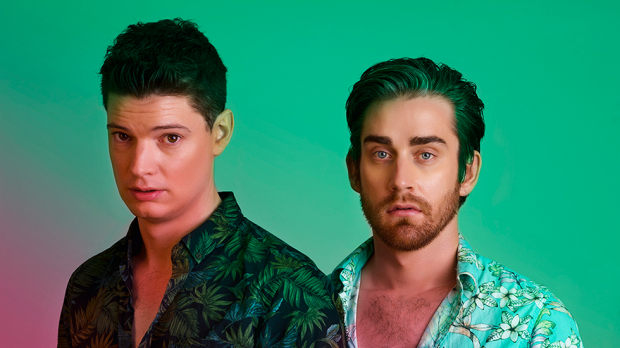
The creative team behind the critically acclaimed FAG/STAG return for the further comedic adventures of Jimmy and Corgan in BALI. Opening at The Subiaco Arts Centre on Wednesday, October 18, Jeffery Jay Fowler and Chris Isaacs take these two endearing messes into a world of unbelievable exchange rates, cheap cocktails and holidaying Australians. DAVID O’CONNELL spoke to The Last Great Hunts’ Fowler and Isaacs about what it’s like to bring these characters back to the stage for a second time.
Tell us what BALI is about?
JJF: BALI is about two guys in their early 30s who have been good friends for a long time, since they were 15. One of them comes from a privileged background, and his mother’s having her 60th in Bali, and she invites them across. Corgan (Isaacs’ character), who’s the wealthy character, goes to Bali all the time, and Jimmy (Fowler’s) has never been and really doesn’t want to go. Once they’re there, they behave like regular Australians in Bali.
That sounds like for good and ill then?
JJF: [tentatively] Yes.
What prompted you to revisit these two characters?
CI: It’s a thing we were talking about after the first season of FAG/STAG. What it would be like revisiting these characters in a different context. They’re sketched in a particular way, because of the form of the play. There’s still room to explore. A lot about these characters was left in the air from FAG/STAG.
JJF: There was some mention of Corgan’s privilege in FAG/STAG, but putting those characters into the setting of Bali aggravates those themes of privilege. Even a normal Australian person in Bali suddenly can live like a king in a resort and have people at their service.
So what’s changed with Corgan and Jimmy?
CI: FAG/STAG was about arrested development. This play they’re kind of on track with their lives. Corgan has a job, but it’s with his mom’s company. So he’s really getting a handout in another way.
JJF: My character has become a team leader, but it’s based on a particular company that friends have worked with that is almost a pyramid scheme. Corgan also has a long term girlfriend, and the friends don’t hangout anymore. Part of the premise is about trying to reunite that friendship. Which is pretty recognisable, and l think everyone experiences it. We do prioritize love over friendship.
Was it difficult to step back into those characters’ shoes?
JJF: We haven’t stepped out of those shoes, we do the show so often…
CI: We’ve just got back from Edinburgh where we did FAG/STAG for 25 days in a row. Which means they’re fresh, we know them quite well.
JJF: FAG/STAG is also a living text, we update it. We still freeze them in time, they’re 29, but we change lines and moments to adapt to the world. For example we’ve changed the conversation on marriage because of the plebiscite.
So writing for the characters again wasn’t a problem?
CI: We spoke about them up to a year beforehand, so we know the characters quite well, and what they would say.
JJF: I think we also take large chunks of ourselves, and put them in and mutate them. There are some parts that absolutely don’t fit me, but there’s enough myself that feels natural onstage.
Did the idea of doing a sequel give you pause?
JJF: I was reading about the Blade Runner sequel and the article posited the idea that people only make sequels because there is money to be made. As we’re in theatre and don’t make any money, we’re certainly not doing this for money, and it is not from a cynical aspect. I thought these were good characters to explain what we were wanting to say. We’re still tempering this project. There’s a really easy project saying that Australians in Bali are disgusting, and I think that’s low hanging fruit. We can make a lot of jokes about the awful way Australians act. When we went to Bali we tried to look at the way people from various social economic classes act… and people really do live up to there stereotypes. And then there are really complex issues about the environment and tourism. Bali’s economy is based on tourism but they are doing massive environmental damage, but if I stop going to Bali, for environmental reasons, I destroy the economic backbone of an island with no natural resources.
CI: One of the successes of FAG/STAG was it would have been very easy to look at homophobia, or to look at the dichotomy of straight and gay, but we dealt with those issues in a very complex way, because they are complex. Although these characters are very matter of fact when they speak, the ideas that they are speaking about have a large breadth. And it’s that sort of thing we want to do with BALI. Don’t try to display how complex these topics are, just write what your character would say, and that shows the complexity of it.